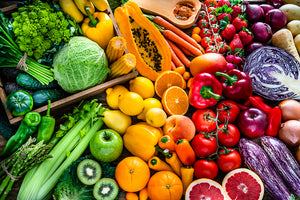Most Nutrient-Packed Fruits and Vegetables
Feb 19, 2021
With busy schedules and limited time to eat or prepare balanced meals daily, it’s tough to consume the amount of nutrients the body needs. In addition to proper supplementation with multivitamins, fruits and vegetables are necessary parts of maintaining an overall nutritionally balanced and healthy lifestyle. So why not choose the ones that pack the most punch? Melissa Daniels, bariatric registered dietitian at the Weight Loss Institute of Arizona in Scottsdale suggests, “Remember to consume a colorful array of fruits and vegetables on a daily basis to receive a variety of nutrients (that are) vital to being the best you.”
Kale
Kale is among the most trendy of the culinary scene’s superfoods. With its high antioxidant and high anti-inflammatory qualities, this leafy vegetable is known to contribute to the body’s innate detoxification system and prevent certain types of cancer via isothiocyanates, Daniels explains. “If you have high cholesterol, think about consuming kale on a regular basis, as its high fiber properties can bind bile acids and prevent cholesterol formation.”
Blueberries
The blueberry, a fruit native to North America, contains multiple phytonutrients, which aid in cardiovascular, cognitive and eye health and blood sugar regulation, and have also been suggested to display anti-cancer effects, Daniels explains. “With only 87 calories per cup, blueberries have one of the highest antioxidant capacities of all known foods,” she says. “Talk about a power punch in a small package!”
Bok Choy
Bok choy, a cabbage native to China, is rich in nutrients, including protein, vitamins and fiber, and contains only 9 calories per cup. It has an abundance of vitamin C — almost two-thirds the recommended dietary allowance per serving for an adult. “Calcium and vitamin K are also found in this wondrous vegetable and, in combination, aid with bone mineralization and blood clotting,” Daniels says.
Oranges
Just a single orange provides almost a full day’s worth of vitamin C, and it can be juiced, diced up in a salad or eaten fresh right after peeling. Oranges also contain potassium, and the opaque membranes around the wedges contain hesperidin, which may help lower cholesterol. Research indicates the fragrance of oranges has a calming effect.
Asparagus
Asparagus is rich in folate and vitamins C, K, A and E. It also contains fairly high amounts of the amino acid asparagine, which acts as a natural diuretic to rid the body of excess water and salt to prevent further fluid retention, Daniels explains. It also contains an impressive 3 grams of protein per cup and can help alleviate cravings due to fluctuating sugar levels. “Working in conjunction with fiber, asparagus slows digestion and ultimately aids in blood sugar regulation and appetite control,” Daniels says.
Avocados
Although avocados occasionally receive a negative reception due to their high fat content, a small to medium size avocado provides approximately 13 grams of monounsaturated fat, which has been found to aid in the reduction of cholesterol and — along with fiber — helps to maintain normal blood sugar levels in the human body. One hundred grams of avocado has approximately 149 more milligrams of potassium than a banana of the same weight. “Hence, when you’re training at the gym to win the gold medal, prevent cramps with avocados rather than bananas,” Daniels suggests.




